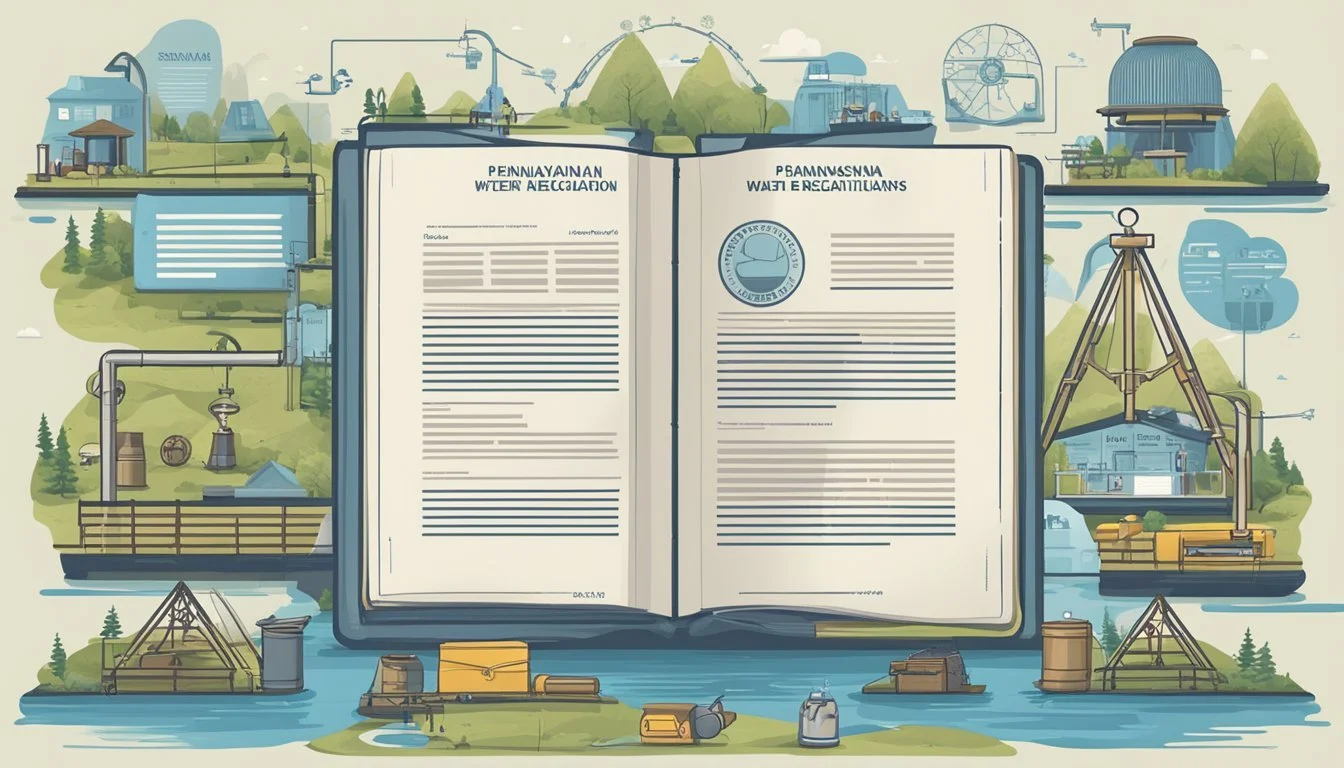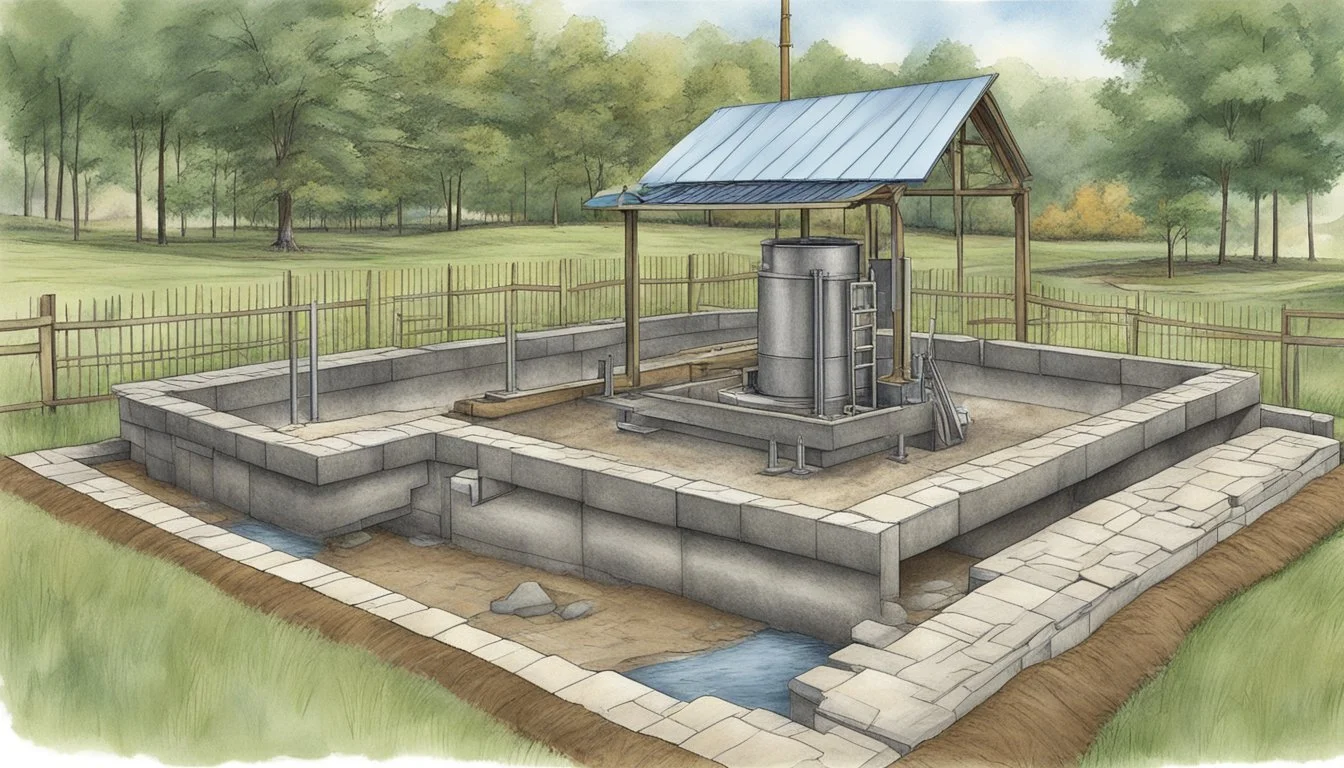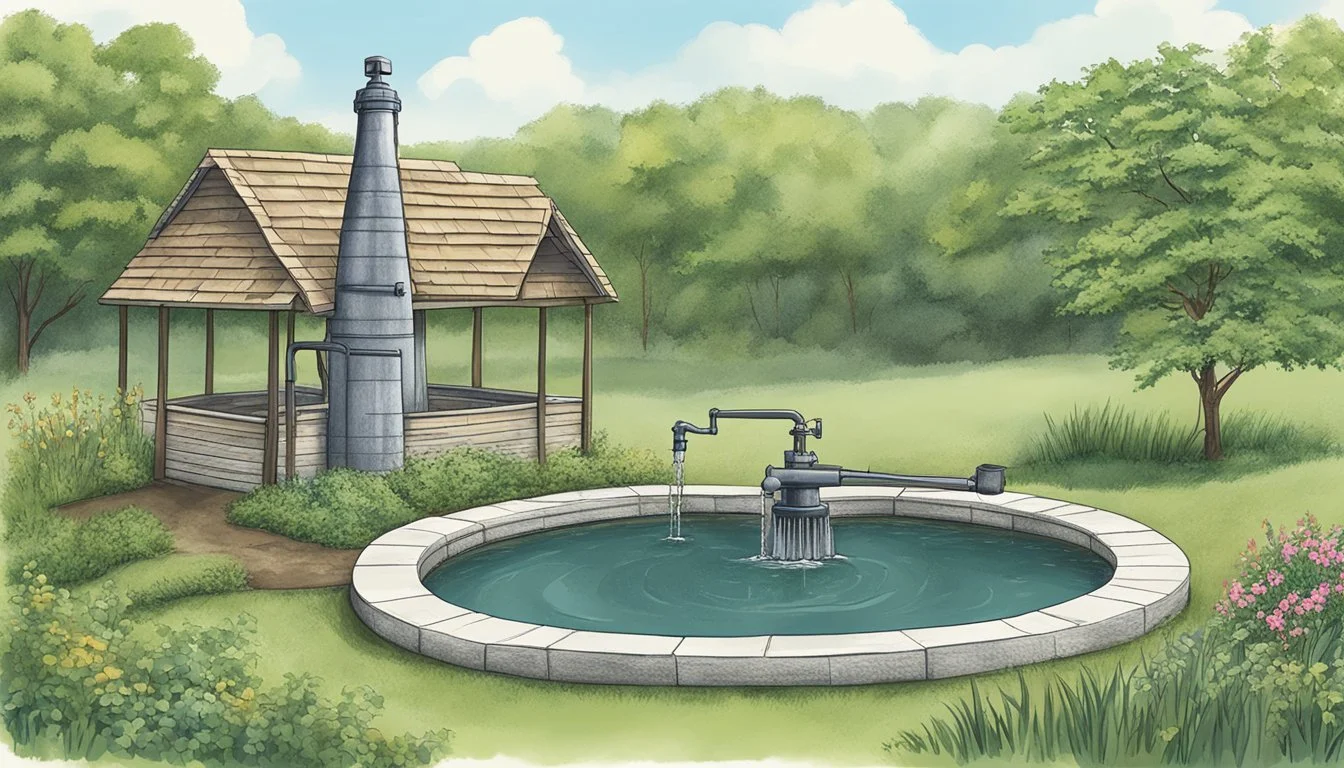Pennsylvania Water Well Regulations
Understanding Compliance for Property Owners
Pennsylvania's approach to managing its groundwater resources reflects both the importance and the complexity of ensuring safe and sustainable water supplies for its residents. With a focus on private well construction, the state offers guidance to homeowners on how to properly maintain their water systems. The Pennsylvania Department of Environmental Protection (DEP) has published resources outlining the essentials of well construction and maintenance, covering aspects such as estimating water needs and protecting water systems from potential sources of pollution. This underscores the state's commitment to safeguarding public health by preventing water contamination.
While Pennsylvania provides recommendations for groundwater management, it is worth noting that there are no statewide regulations directly governing the construction or maintenance of private water wells, springs, and cisterns. This places the onus of responsible water supply management largely on individual homeowners. The Penn State Extension supports this self-regulatory framework with educational materials that assist in the proper design, location, construction, testing, and treatment of private water systems. Homeowners are encouraged to engage proactively in their water systems' management to ensure that their wells operate safely and efficiently.
However, any water well drillers operating in the state must be licensed according to state regulations, with certain exceptions such as farmers or individuals drilling at their own residence. Further supporting the regulatory framework, some local governments in Pennsylvania have enacted their own water supply well construction standards, which residents are encouraged to investigate and adhere to. Together, these layers of guidance and regulation form a comprehensive approach to groundwater resource management in Pennsylvania, aiming to ensure that private wells provide safe, clean water for all users.
Legal Framework and Compliance
This section outlines the regulatory structures and compliance procedures related to water well drilling and maintenance in Pennsylvania. It covers state-specific regulations, federal standards, and the necessary permits and procedures to ensure lawful operations.
Pennsylvania Water Well Regulations
In Pennsylvania, the Department of Environmental Protection (DEP) plays a pivotal role in enforcing the regulations for water wells. Specifically, the Water Well Drillers License Act requires drillers to obtain a license, contributing to responsible water resource management. The Bureau of Geological Survey, part of the Department of Conservation and Natural Resources, supports this by offering crucial geological data to guide appropriate drilling practices. These regulations aim to prevent contamination and ensure sustainable water use.
EPA Standards and Acts
Water well standards in Pennsylvania are aligned with the Environmental Protection Agency’s (EPA's) regulations to protect groundwater sources. The Groundwater Rule (GWR) is a federal regulatory measure applied to public water systems, including those combining surface and groundwater, to reduce the risk of contamination. By adhering to such EPA guidelines, Pennsylvania assures that the quality of its drinking water complies with established safety criteria.
Permit Requirements and Procedures
The acquisition of permits is a strict requirement for individuals or entities wishing to drill water wells in the state. The Safe Drinking Water chapter mandates well owners to follow procedures that involve notice of intent filings, application with accompanying fees, and adherence to construction and abandonment standards. This ensures that the well owner operates within legal boundaries set forth by the Pennsylvania DEP, guaranteeing that water sources remain safe and sustainable for the community.
Water Well Design and Construction
In the state of Pennsylvania, adhering to stringent design and construction standards is essential for the integrity and safety of water wells. These standards ensure that water sources remain uncontaminated and that the structure of the well is sound for long-term use.
Well Construction Techniques
Well construction techniques in Pennsylvania must meet specified guidelines. This involves careful planning of the well's location, depth, and the methodology used to reach the water-bearing formations. Techniques such as rotary drilling or cable tool drilling are commonly employed, each with their specific applications and benefits. Understanding the geological conditions is crucial when selecting the appropriate drilling method to prevent future complications.
Choosing Materials for Construction
Materials for well construction are chosen based on durability and safety. The most common materials include PVC or steel for the well casing, which acts as a structural retainer for the well opening, and gravel or sand for filtering out debris around the casing. Additives, like specific types of cement, are then used to create a secure seal in the annular space between the casing and the borehole, preventing contaminants from entering the well.
Ensuring Proper Construction and Safety
Adherence to safety standards and proper construction practices is imperative for the well's longevity and the safety of the water supply. The construction must include a watertight seal at the top to keep out pollutants and vermin. Casing integrity is also critical; it must extend above the ground to prevent contamination and ensure easy access for inspection, maintenance, and repair. Comprehensive construction information and guidelines are available through the Pennsylvania Department of Environmental Protection to guide contractors and homeowners in these efforts.
Operation and Maintenance
Ensuring the safety and functionality of Pennsylvania’s water wells is crucial. This section provides guidelines for routine water testing, wellhead protection measures, and maintenance practices for well owners. Adherence to these practices is vital for protecting groundwater and ensuring a reliable water supply, especially during times of drought.
Routine Water Testing
Regular water quality testing is essential for monitoring the presence of common contaminants that may affect health. Well owners should test their water:
Annually for coliform bacteria, nitrates, total dissolved solids, and pH levels.
Every two to three years for tannins, sulfates, and other locally prevalent contaminants.
Wellhead Protection Measures
Wellhead protection involves safeguarding the area surrounding the well to prevent contamination. Key measures include:
Maintaining a clearance zone free of chemicals, waste, and animal enclosures.
Installing a sanitary seal or cap to prevent direct entry of pollutants.
Maintenance Guidelines for Well Owners
Well owners carry the responsibility of maintaining their well to prevent malfunction and contamination. They should:
Inspect the well and related equipment regularly for signs of wear or damage.
Service the well by a licensed professional every ten years, or sooner if issues arise.
Water treatment systems should be reviewed regularly, especially after detecting any water quality changes. Proper maintenance not only protects individual health but sustains the integrity of the regional groundwater resources.
Water Quality and Contamination Prevention
Maintaining the quality of water from private systems in Pennsylvania is critical to avoiding health risks associated with contamination. This section addresses the main aspects of managing potential contaminants and the treatment options available for private water systems, including wells, cisterns, and springs.
Identifying and Managing Contamination Risks
Contamination of private water systems can derive from various sources, such as agricultural runoff, faulty wastewater systems, or industrial pollutants. It’s essential for owners of private water systems to regularly test their water to detect contaminants like coliform bacteria, nitrates, and total dissolved solids. The Pennsylvania Department of Health recommends annual testing of well water. Protecting the well’s location from potential sources of pollution is equally important to reduce health risks and ensure safe drinking water.
Common Contaminants Include:
Coliform bacteria
Nitrates
Total dissolved solids
pH level abnormalities
Owners should also consider the potential for naturally occurring contaminants in their drinking water source, such as radon or heavy metals, and apply specific measures to manage these risks.
Treatment Options for Private Water Systems
When contamination is detected, several treatment options are available for private water systems to ensure the provision of safe drinking water. The deployment of treatment systems depends on the types of contaminants present and their concentration levels.
Treatment Systems May Include:
Filtration systems to remove particulate matter
Ultraviolet (UV) purification to kill bacteria and viruses
Reverse osmosis to reduce dissolved solids
Distillation units for removing nitrates and heavy metals
Homeowners should consult with drinking water certified labs for testing and treatment advice. The chosen water treatment option should effectively address the specific contaminants identified in the test results while being suitable for the type and size of the private water system, whether it is a well, spring, or cistern.
Well Driller and Owner Responsibilities
In Pennsylvania, water well drillers and owners are required to follow strict regulations to ensure the safety and integrity of water wells. Drillers must obtain proper licensing and complete thorough training, while both drillers and owners are responsible for comprehensive record keeping and the correct abandonment of wells.
Licensing and Training for Drillers
Water Well Drillers License: Before initiating drilling activities, drillers must secure a Water Well Drillers License, ensuring they adhere to state standards for well construction and groundwater protection. Adequate training is mandated to provide professionals with the knowledge to avoid mishaps, and to promote sustainable resource management.
Record Keeping and Reporting
Completion Reports: Upon the completion of water well construction, drillers must submit a detailed completion report to the well owner and the relevant state bureau. These reports must include specifications of the well construction and information about the groundwater source.
Monitoring Wells and Well Records: Drillers are also responsible for keeping accurate records of monitoring wells, ensuring the continuous oversight of water quality and availability. These records contribute to a comprehensive understanding of Pennsylvania's groundwater resources.
Well Abandonment Practices
Abandonment of Well: If a water well is to be retired, strict abandonment procedures must be followed to prevent contamination. It is essential that both the driller and the private water well owner understand and comply with these practices, to protect the environment and public health.
Private Water Well: Private water well owners should be familiar with abandonment protocol to verify that the process complies with state law, safeguarding their property and the surrounding area from potential hazards associated with improper well closure.
Water Supply Planning and Conservation
Water supply planning and conservation in Pennsylvania require a strategic approach aimed at balancing water demand with sustainable supply. It involves careful assessment of water needs, proactive drought management, and the promotion of water conservation practices among communities and industries.
Assessing and Estimating Water Needs
Pennsylvania's approach to assessing water needs relies on a comprehensive understanding of current and future demands. The 25 Pa. Code Chapter 110 lays out the framework for registration requirements that public water supply agencies must follow, ensuring an orderly collection of data for effective resource management. This information underpins water supply planning, particularly for high-need sectors like agriculture and industry, where the accuracy of estimating water needs is critical.
Drought Management and Alternative Supplies
In periods of drought, the state's resources can become strained, prompting the need for robust drought management strategies. Strategies include the identification and use of alternative water supplies, which may encompass the use of bottled water in emergency situations or the development of infrastructure to tap into previously unused water sources. A key component of drought resiliency is the ability to switch to alternative supplies without significant disruption to consumers, especially those with low-yielding wells.
Encouraging Water Conservation Practices
The promotion of water conservation practices is essential in maintaining the state's water reserves. Conservation efforts are emphasized through education and the implementation of water-efficient technologies. Practices like rainwater harvesting, use of low-flow fixtures, and xeriscaping are encouraged to reduce reliance on traditional water supplies. This not only serves to preserve the environment but also provides a buffer against water scarcity for households, particularly where the local well yield may not meet the households' water needs.
By focusing on systematic planning, adaptable management, and proactive conservation, Pennsylvania aims to ensure a reliable water supply for all its residents and ecosystems.
Resources and Further Information
For those seeking comprehensive knowledge regarding water well regulations in Pennsylvania, the following resources are invaluable. They provide detailed educational materials and data access to inform homeowners and professionals alike about groundwater management and well maintenance.
Educational Materials from Penn State Extension
Penn State Extension offers a plethora of educational materials for private water system owners. These resources cover topics such as proper well construction, water needs estimation, and ensuring the safety of the water supply. The materials follow the standards set forth by ANSI and other regulatory frameworks, ensuring that users are receiving information that is both accurate and actionable. For further assistance, the "Contact Us" function on the Penn State Extension website facilitates direct engagement with experts.
Access to the Pennsylvania Groundwater Information System
The Pennsylvania Groundwater Information System (PaGWIS) is a comprehensive repository of groundwater data. Hosted by the Pennsylvania Department of Conservation and Natural Resources, this system provides users with access to water well records and spring data. It serves as an essential tool for researchers and the public to explore in-depth information from the Pennsylvania Geologic Data Exploration, fostering informed decision-making regarding groundwater management.
Frequently Asked Questions
Understanding the regulations and requirements for water wells in Pennsylvania ensures both legal compliance and maintains the safety of drinking water for private well owners.
What are the requirements for obtaining a water well permit in Pennsylvania?
In Pennsylvania, well contractors need a license to drill water wells, as indicated by the Pennsylvania Code & Bulletin. Property owners must file a notice of intent to drill and adhere to state guidelines before obtaining a permit.
How does Pennsylvania's Groundwater Rule impact private well owners?
The Pennsylvania Groundwater Rule requires additional protection for water that is under the direct influence of surface water. Private well owners should ensure their wells are properly constructed and maintained to prevent contamination.
What minimum depth is mandated for water wells in Pennsylvania?
There is no statewide minimum depth for water wells in Pennsylvania. However, wells must be sited and constructed according to guidelines to protect from contamination, the specific details of which can be found on the Pennsylvania Department of Environmental Protection website.
Are property owners allowed to drill their own wells without professional assistance in PA?
Property owners in Pennsylvania are not prohibited from drilling their own wells. However, it is critical to follow well construction standards to ensure the well does not become contaminated.
What are the guidelines for maintaining water quality in private wells in Pennsylvania?
Well maintenance is crucial in Pennsylvania, and the state provides recommendations for routine testing and tips on keeping wells secure from pollutants.
Does Pennsylvania offer any resources for private domestic well owners to ensure safe drinking water?
Yes, the Pennsylvania Department of Health provides resources, including a Private Well Water Factsheet, to educate well owners on best practices for maintaining their well and protecting their drinking water quality.








